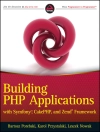Clear, practical Clojure for the professional programmer
Professional Clojure is the experienced developer’s guide to functional programming using the Clojure language. Designed specifically to meet the needs of professional developers, this book briefly introduces functional programming before skipping directly to the heart of using Clojure in a real-world setting. The discussion details the read—eval—print workflow that enables fast feedback loops, then dives into enterprise-level Clojure development with expert guidance on web services, testing, datomics, performance, and more. Read from beginning to end, this book serves as a clear, direct guide to Clojure programming—but the comprehensive coverage and detail makes it extraordinarily useful as a quick reference for mid-project snags. The author team includes four professional Clojure developers, ensuring professional-level instruction from a highly practical perspective.
Clojure is an open-source programming language maintained and supported by Cognitect., and quickly gaining use across industries at companies like Amazon, Walmart, Facebook, Netflix, and more. This guide provides a concise, yet thorough resource for professional developers needing to quickly put Clojure to work.
- Parse the difference between functional and object-oriented programming
- Understand Clojure performance and capabilities
- Develop reactive web pages using Clojure Script
- Adopt an REPL-driven development workflow
Clojure is a modern dialect of Lisp, designed for concurrency and Java compatibility. It can be used with the Java virtual machine, Microsoft’s Common Language Runtime, and Java Script engines, providing a level of both versatility and functionality that is appealing to more and more enterprise-level developers. As requirements grow increasingly complex, stepping away from imperative programming can dramatically streamline the development workflow. Professional Clojure provides the expert instruction that gets professionals up to speed and back to work quickly.
Mục lục
INTRODUCTION xv
CHAPTER 1: HAVE A BEGINNER’S MIND 1
Functional Thinking 2
Value Oriented 2
Thinking Recursively 5
Higher Order Functions 8
Embracing Laziness 11
When You Really Do Need to Mutate 12
Nil Punning 15
The Functional Web 16
Doing Object-Oriented Better 16
Polymorphic Dispatch with defmulti 18
Defining Types with deftype and defrecord 20
Protocols 21
Reify 22
Persistent Data Structures 23
Shaping the Language 27
Summary 29
CHAPTER 2: RAPID FEEDBACK CYCLES WITH CLOJURE 31
REPL-Driven Development 32
Basic REPL Usage with Leiningen 32
Remote REPLs with n REPL 34
REPL Usage with a Real Application 35
Connecting Your Editor to a REPL 39
Reloading Code 40
Reloading Code from the REPL 40
Automatically Reloading Code 43
Writing Reloadable Code 49
Summary 51
CHAPTER 3: WEB SERVICES 53
Project Overview 53
Namespace Layout 54
Elements of a Web Service 55
Libraries, Not Frameworks 55
HTTP 55
Routing 64
JSON Endpoints 70
Example Service 74
Create the Project 75
Additional Namespaces 75
Default Middleware 77
The Storage Protocol 78
Handlers 83
Middleware 88
Routes 89
Deployment 94
Using Leiningen 94
Compiling an Uberjar or Uberwar 95
Hosting 96
Summary 97
CHAPTER 4: TESTING 99
Testing Basics with clojure.test 100
with-test 101
deftest 101
are 102
Using Fixtures 103
Testing Strategies 104
Tests Against DB 104
Testing Ring Handlers 106
Mocking/Stubbing Using with-redefs 108
Redefining Dynamic Vars 110
Record/Replay with VCR 111
Measuring Code Quality 112
Code Coverage with Cloverage 112
Static Analysis with kibit and bikeshed 114
Keeping Dependencies Under Control 116
Testing Framework Alternatives 119
Expectations 119
Speclj 119
Cucumber 120
Kerodon 126
Summary 127
CHAPTER 5: REACTIVE WEB PAGES IN CLOJURESCRIPT 129
Clojure Script Is a Big Deal 129
A First Brush with Clojure Script 131
Starting a New Clojure Script Project 132
Getting Fast Feedback with Figwheel 132
Creating Components 134
Modeling the Data 135
Responding to Events and Handling State Change 136
Understanding Errors and Warnings 137
Namespace Layout 141
Styling 141
Form Inputs and Form Handling 142
Navigation and Routes 145
HTTP Calls: Talking to a Server 147
Drag and Drop 149
Publishing 150
Reagent in Depth 151
Form 1: A Function That Returns a Vector 151
Form 2: A Function That Returns a Component 152
Form 3: A Function That Returns a Class 153
Sequences and Keys 154
Custom Markup 155
Reactions 156
A Note on Style 158
Testing Components with Devcards 159
Interop with Java Script 162
One Language, One Idiom, Many Platforms 164
Things to Know About the Closure Compiler and Library 164
Modeling State with Data Script 165
Go Routines in Your Browser with core.async 166
Summary 167
CHAPTER 6: THE DATOMIC DATABASE 169
Datomic Basics 170
Why Datomic? 170
The Datomic Data Model 172
Querying 175
Transactions 181
Indexes Really Tie Your Data Together 183
Datomic’s Unique Architecture 187
Modeling Application Data 188
Example Schema for Task Tracker App 188
Entity ids and Partitions 196
Datomic’s Clojure API 197
Basic Setup 197
Experimenting in the REPL 200
Building Applications with Datomic 206
User Functions 206
Account Functions 209
Task Functions 210
Deployment 213
The Limitations 214
Summary 215
CHAPTER 7: PERFORMANCE 217
What Is Performance? 219
Choosing the Right Data Structure Is a Prerequisite for Performance 219
Benchmarking 221
Timing Slow Things 221
Use Criterium for Timing Fast Things 223
Use Test Selectors for Performance Tests 225
Parallelism 225
Memoization 226
Inlining 227
Persistent Data Structures 228
Safe Mutation with Transients 228
Profi ling 229
Avoiding Reflection with Type Hinting 230
Java Flags 232
Math 232
Summary 232
INDEX 235
Giới thiệu về tác giả
About the authors
Jeremy Anderson is a Developer at Code Adept, and a Clojure contributor.
Michael Gaare is the platform technical lead at Nextangles, a financial technology startup.
Justin Holguín is a software engineer at Puppet Labs, where he specializes in Clojure backend services.
Nick Bailey is a Clojure enthusiast and the maintainer of the Clojure java.jmx library. He is a software architect at Data Stax.
Timothy Pratley is a Clojure contributor at Outpace Systems, Inc.
Visit us at wrox.com where you have access to free code samples, Programmer to Programmer forums, and discussions on the latest happenings in the industry from around the world.










